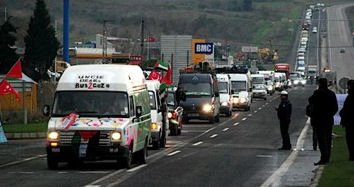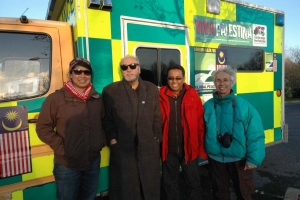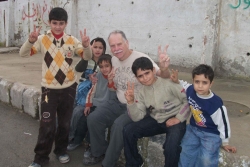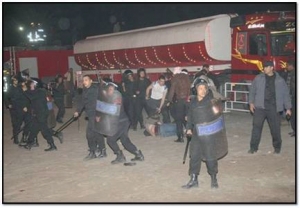A journey of hope from San Diego to Gaza
 by Faith Attaguile
by Faith Attaguile
August 24, 2010 (San Diego) -- Recently I spoke to a group of people about a 31-day journey I took a few months ago. It was a land convoy to Gaza of 200 vehicles and 500 people from 17 different countries. We were Muslims, Jews, Christians, Hindus, Atheists and Humanists journeying together over 4,000 miles through 13 countries. We traveled from London to Gaza on a journey of hope.
We drove through rain, snow, fog and sunshine. We drove all day and often into the night. We drove on freeways, pot-holed roads, through the Alps, along coastlines and across deserts. We slept on floors, pavement, in tents and sports arenas. Often we drove at night to meet destination deadlines. We succeeded despite many roadblocks, including a terrifying attack on our convoy by Egyptian riot-police when we were only 15 miles from Gaza.
It wasn’t easy, but we had a purpose. We were bringing our donated ambulances, minivans and trucks filled with medical and humanitarian aid to the suffering Palestinians of Gaza. Our goal was to break the brutal land, sea and air blockade of Gaza, imposed by Israel for over three years.
As I spoke, someone asked, “But isn’t there a blockade because Palestinians are sending rockets into Israel? What’s the problem with the Palestinians anyway? Why don’t they want to make peace with the Israelis?”
“OK,” I said. “I'll digress from my story for a moment. Let’s try to imagine what we’d do if we had been suffering under a 43-year military occupation by, say Mexico. Imagine a war 43 years ago where Mexico invaded and occupied California, forcing us to live under Mexican occupation since then.
“Imagine what it would be like with our best lands and precious water resources taken over by Mexico. Imagine how we'd feel with 60% of California under full Mexican control and 12 million Mexicans building Mexican-only colonies on the best California land, protected by the Mexican Army and serviced by hundreds of miles of Mexican-only roads we can't use. Our houses and farms have been destroyed in order to build these Mexican-only colonies.
“Every day we are forced to pass through thousands of roadblocks and checkpoints dotting California. They prevent us from traveling freely from one town to another, visiting our families, receiving medical care, going to work. We must wait for hours at these checkpoints – even when we only need to go a few miles -- humiliated by Mexican soldiers calling us names. Trucks bringing in supplies and food have to unload and reload at every checkpoint they pass through as they journey to their destinations. Often their food spoils in the heat.
“If we can imagine what we'd feel like under these conditions – then we might be able to imagine what it's like for Palestinians, suffering over 43 years of Israeli occupation. What I've described to you is precisely what is happening to the Palestinian people. If we had been suffering in this way, might we try to resist in whatever way we had available to us?”
“Maybe so,” someone piped in. “Maybe I’d be mad. And maybe the situation for Palestinians is really unjust. But does this give them the right to kill innocent Israeli civilians with rockets?”
I replied, “Look. In nine years 13 Israeli's have died from Palestinian rockets. In only 22 days last year over 1,400 Gazans died from Israeli attacks by helicopter gunships and F-16s. Gaza was almost completely destroyed in that attack. This is not to argue that one death is worth less than another. But I don't think I have the right to judge how someone else fights against occupation. The Palestinians have been occupied by the Israelis for over 43 years, not the other way around.
“Still, however we may answer that question, that fact is that the terrible suffering of European Jews during WWII does not justify invasion, occupation and expulsion of Palestinians from their lands to clear the way for a Jewish state. Two wrongs don't make a right. Yet this is precisely what Israelis have done and are doing to hundreds of thousands of Palestinians whose families have been living in Historic Palestine for over 2000 years.
“It's important to remember that Palestinians were not responsible for the Holocaust. Europeans were. Why should Palestinians have to pay for what Europeans did? When Israel was founded in 1948, over 700,000 Palestinians were expelled from their lands -- their homes, families, and lives destroyed. Like I said, two wrongs don't make a right.”
The group was quietly buzzing. I waited. Finally, a young man, looking at my gray hair, asked why someone as old as me would take such a trip when I didn’t have to go. I said, “Ah, but that’s the catch. I did have to go. I had to protest what is being done to the Palestinian people in my name and with my tax money. But let me tell you the story of my trip.”
4,000 Miles to Gaza: From Europe to the Middle East
 We started from London on December 6, 2009. It was a cold, gray, rainy day. There were three of us from San Diego: myself, Larry Hampshire and Hany El-Saidany. Larry and Hany joined the convoy in Istanbul. I drove an ambulance from London to Istanbul where I met them and the 32 other Americans waiting to join. When we left London we were about 130 people in 29 vehicles. By the end we were 500 people in 200 vehicles.
We started from London on December 6, 2009. It was a cold, gray, rainy day. There were three of us from San Diego: myself, Larry Hampshire and Hany El-Saidany. Larry and Hany joined the convoy in Istanbul. I drove an ambulance from London to Istanbul where I met them and the 32 other Americans waiting to join. When we left London we were about 130 people in 29 vehicles. By the end we were 500 people in 200 vehicles.
The first night of our 10-day European trip was a taste of what was to come. Arriving after dark, we stopped just outside Brussels. Our “lodging” was a massive parking lot with no grass to pitch tents on and one small port-o-potty for 130 people. No place to buy food, no water. Yet everyone chipped in, shared what they had (some had vans equipped with cooking stoves), and laughed at the inconvenience. Someone said, “We can see the end of our inconvenience. Imagine what it’s like for the people of Gaza who can’t?”
By the time we hit Istanbul 10 days later we had traveled through 8 countries: Britain, France, Belgium, Luxemburg, Germany, Austria, Italy and Greece. From Italy we took an all-night ferry to Greece, then moved on to Turkey. Although the mountains in Austria were spectacular, when we dragged into Istanbul our heads were spinning from car parks, service stations and breakdowns. Fatigue from grueling freeway drives and cold car-park nights had taken its toll.
 Throughout Europe people were generally supportive, but it was a quiet support. We therefore weren’t prepared for what we found from the people of Turkey, Syria, Jordan and Egypt. Here the welcome was loud, joyous and colorful. It was full of tears, hugs, laughter and excitement. Bands played traditional songs. Speeches were made. Whether passing through small towns or big cities, people lined the streets and welcomed us with cheers, banners, waves and peace signs. Every step of the way we were greeted as though we were VIPs.
Throughout Europe people were generally supportive, but it was a quiet support. We therefore weren’t prepared for what we found from the people of Turkey, Syria, Jordan and Egypt. Here the welcome was loud, joyous and colorful. It was full of tears, hugs, laughter and excitement. Bands played traditional songs. Speeches were made. Whether passing through small towns or big cities, people lined the streets and welcomed us with cheers, banners, waves and peace signs. Every step of the way we were greeted as though we were VIPs.
Larry said, “It was as though we were the team being celebrated in the Superbowl.”
After a late-afternoon arrival in Gaziantep, Turkey, we were ushered to our sports arena lodgings. I took a much-needed shower (showers were a real luxury on this trip). As I returned to the women’s sleeping area, a group of local women, all dressed in conservative Muslim attire, approached me. They wanted to interview me for a local radio show. They wanted to know why an American woman was traveling to Gaza.
I explained, “I’m here to stand in solidarity with the Palestinian people and speak out against my government’s policies. Our money has made Israel into one of the most powerful militaries in the world. The weapons Israel uses to attack the Gazan people and illegally occupy Palestinian lands have ‘Made in the U.S.A.’ labels on them. I’m here to protest that and demand that Palestinians be given their full human rights as members of the world community.”
When the young woman translating for the group finished her job, she turned to me and said, “You know, I don’t know whether you believe in God or not and that doesn’t matter. It matters what’s in your heart, and our hearts are the same I think.” The rest of the women standing there wouldn’t let me go, smiling, holding my hands, hugging me.
It was this way with the people we met wherever we went throughout the Middle East. The intensity of their joy and welcome was breathtaking. I will never forget the women I met. I will never forget how they would smile shyly at me; then -- when I held out my arms -- hold me close, crying, kissing my cheeks again and again, thanking me, holding a hand at their hearts, calling me “Sister.” It was overwhelming.
You see, to many of these women (along with their husbands, friends and families) our convoy represented a lifeline back to their families in Palestine. Our presence was a link to families they no longer believed they would see again. One woman gave me a little wooden key she had carved and said, “Here, I give you the key to my home in Palestine. My home is now your home.”
4,000 Miles to Gaza: The Attack
 I mentioned earlier that we faced many roadblocks along our journey and one of them involved an attack by riot-clad Egyptian police. That assault happened the night of January 5, 2010 and came as we waited in the Egyptian part of Al-Arish, only 15 miles from Gaza.
I mentioned earlier that we faced many roadblocks along our journey and one of them involved an attack by riot-clad Egyptian police. That assault happened the night of January 5, 2010 and came as we waited in the Egyptian part of Al-Arish, only 15 miles from Gaza.
Earlier that day negotiations had taken place between convoy spokespeople and Egyptian authorities regarding the convoy's American vehicles. After paying the expenses of bringing in these vehicles (valued at $500,000) and after Egyptian authorities had accepted them into their port, we were informed the vehicles would not be allowed into Gaza without Israel's consent. In the early afternoon Egyptian authorities walked out of the negotiations and military police ominously moved in.
Five hundred black-clad riot police lined up in front of locked port gates while we watched from inside, imprisoned by port walls. Three hundred plain-clothed police armed with sticks and bats lined up behind them. Trucks filled to the brim with broken concrete rocks dumped their loads in piles behind the police. An 18-wheeler water tanker drove up to the same area. Grim, black holding vans with barred windows pulled in, parking in formation at the back. Suddenly a scuffle broke out at the gates. Police began hurling concrete rocks, tear gas canisters and water hoses over port gates at us. It was an all-out riot. It was terrifying.
Eventually – as though an order from above had been issued -- the attack ceased and the police withdrew. Many of our vehicles were damaged. Seven of us had been arrested. About 40 were injured, some so severely they had to be taken to the hospital.
Why attack people who weren’t a military threat, whose vehicles and aid had been approved for entry by Egyptian authorities, and whose only goal was to bring aid and comfort to the people of Gaza? I suggest we Follow the Money. After Israel, Egypt is the second largest recipient of U.S. foreign aid. This year $1.3 billion was given with a caveat: its receipt was contingent on Egypt’s agreement to assist in Israeli “security concerns.” Apparently our donated ambulances and humanitarian aid represented a threat to Israeli “security concerns.” By attacking us the Egyptian government revealed its first loyalty to the U.S. and Israel.
That night we all huddled together on the mosque floor in the Al-Arish port, a chaotic hodgepodge of sleeping bags, pillows, coats and what little food we had been able to scrounge up. We tried sleeping but had little success. Later the next day negotiations continued. At last agreement was reached. Those who had been arrested were released. The American vehicles would be driven to Lebanon and Syria for distribution to Palestinian refugees there. We were free to go but it was a long wait for many as about 160 vehicles had to pass one-by-one through Egyptian customs.
4,000 Miles to Gaza: Breaking the Siege
We began entering Gaza late that night. The people of Gaza had been waiting for us for 31 days. Thousands lined the streets – men, women, children, cheering our entry, offering us flowers and handshakes. Celebration was in the air! If Palestinians in other countries who cannot return to their lost homes saw us as a lifeline to their families, in Gaza Palestinians who cannot leave their homes saw us as a lifeline to the world.
A few people in a Little Convoy with a Big Idea had traveled over 4,000 miles through many roadblocks to break the siege of Gaza. 500 people of different colors, different religions, different philosophies and from different countries had joined together to tell the Palestinian people, “You are not alone.” Our little convoy, traveling in solidarity with the Palestinian people, told those in power, “As citizens of the world we condemn the siege of Gaza and we will break it!” They tried to stop us but failed. The people won.
Who wants peace and who doesn’t?
I finished my talk and asked if there were any questions. A woman stood up and asked, “If Palestinians want to end the siege and have peace, why don’t they just sit down with Israel and do that?”
“Really, you know, it’s the Israelis who don’t want peace, not the Palestinians,” I replied. “Just look at the facts. Since the early 1970s the Palestinians have been offering to settle the conflict along the pre-1967 borders. They would settle the conflict by giving Israel 80% of their original land and keeping only 20%. The U.N. has endorsed this. Israel has rejected it.”
I paused a second, then continued, “Think about that. For over 35 years Israel has refused to accept this peace offer. Instead, it continues down the path of destroying Palestinian lives and stealing their lands, inch by inch. Thus, while choking them to death, Israel says that before it will give them air, Palestinians must recognize Israel's ‘right to exist.’ Palestinians reply, ‘Get your boots off our necks and off our land. Then we can talk.’
“The Israeli translation? ‘They don’t want peace.’ I’d say that’s a brilliant inversion of reality. How would we respond if that happened to us?”
The opinions expressed in this editorial reflect the views of its author and do not necessarily reflect the views of East County Magazine. If you wish to submit an editorial, contact editor@eastcountymagazine.org.







Comments
from Danny Ayalon in the Wall Street Journal
There have been millions of people killed and hundreds of millions live in abject poverty without access to basic staples. And yet hundreds of high-minded "humanitarian activists" are spending millions of dollars to reach Gaza and hand money to Hamas that will never reach the innocent civilians of Gaza.
This is the same Gaza that just opened a sparkling new shopping mall that would not look out of place in any capital in Europe. Gaza, where a new Olympic-sized swimming pool was recently inaugurated and five-star hotels and restaurants offer luxurious fare.
Markets brimming with all manner of foods dot the landscape of Gaza, where Lauren Booth, journalist and "human rights activist," was pictured buying chocolate and luxurious items from a well-stocked supermarket before stating with a straight face that the "situation in Gaza is a humanitarian crisis on the scale of Darfur."
No one claims that the situation in Gaza is perfect. Since the bloody coup and occupation by Hamas of Gaza in 2007, in which more than 100 Palestinians were killed, Israel has had no choice but to ensure that Hamas is not able to build up an Iranian port on the shores of the Mediterranean. Until Hamas meets the three standards laid out by the international community, namely renouncing violence, recognizing Israel's right to exist and abiding by previously signed agreements between Israel and the Palestinian Authority, Hamas will continue to be shunned by the international community.
While Israel's policy is to continue to see that all civilian needs are addressed, it can not allow Hamas to rearm and use Gaza as a base to attack Israel and beyond. For this reason, Israel initiated a blockade, fully legal under international law, to ensure that no items can be appropriated by Hamas to attack innocent civilians. Organizations that wish to join the U.N. and the Red Cross to deliver goods or aid to Gaza are welcome to do so through the Kerem Shalom crossing or even through Egyptian ports. Those that refuse and seek to break the legal blockade to boost Hamas are interested in provocation.
Gaza
you are absolutely right Faith-they want peace. See below from the AP today.........
Hamas leader rejects talks with Israel
more from those lovely Gazans who want peace
3,000 Hamas Supporters Celebrate the Cold-Blooded Murder of Four Jews and a Fetus
Palestinians, supporters of the Islamic Hamas group, raise their right index fingers in the air as a sign of loyalty to the group during a rally, to celebrate a militant attack in the southern West Bank,